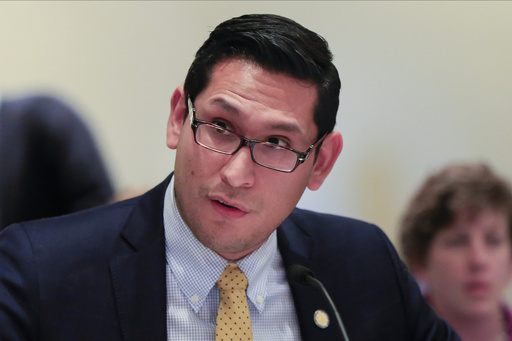
As the final moments of campaigning unfold, candidates are intensifying their efforts with vigorous rallies and promotional ads, making a last-minute appeal to voters. Despite the high-energy environment, the battle for control of Congress remains evenly poised, with the House election seen as a true toss-up and a fierce competition for the Senate.
The outcome of the upcoming election on Tuesday is significant, as it will influence the future of the nation by determining whether the White House will work with supportive allies or face skeptics within Congress, potentially mirroring the divided and often chaotic Congress of the previous term, which has been highlighted as one of the least productive in recent history.
Voters are weighing their choices for president, caught between Republican Donald Trump and Democrat Kamala Harris, while also deciding who will represent them in Congress. “I’m an independent because I’m dissatisfied with both presidential candidates,” stated Gary Motta of Cuyahoga Falls, Ohio, as he attended a weekend event for Republican Kevin Coughlin, who aims to defeat Democratic Rep. Emilia Sykes.
The fight for control of Congress has been ongoing for months, with candidates debating key issues such as the economy, immigration, reproductive rights, and the integrity of democracy itself. This session has seen notable turbulence as the GOP-led House struggled with leadership changes and narrow escapes from government shutdowns.
This presidential election marks the first since the Capitol was stormed on January 6, 2021, and many Republican lawmakers who opposed the certification of Joe Biden’s election are up for reelection. Republican candidates, frequently supported by Trump, now face scrutiny over various issues, including a controversial Supreme Court ruling that nullified abortion rights.
On the other hand, Democrats are being challenged about the Biden-Harris administration’s handling of border security and rising inflation during their tenure. Most contentious House races are taking place in states like New York and California, areas that have been battlegrounds with notable Republican gains in the past. Now, Democrats, led by Hakeem Jeffries of New York, are striving to reclaim these critical seats.
California Rep. Pete Aguilar, Democratic caucus chair, is embarking on a series of nine campaign stops across the state to regain lost seats. “There’s a palpable energy among the voters,” remarked Suzan DelBene, head of the Democratic Congressional Campaign Committee, while campaigning in Omaha, Nebraska, recognizing this city as a critical battleground after her time in New York. “Our volunteers are motivated, and people are clearly aware of what’s at stake.”
This election cycle is marked by extraordinary fundraising efforts, with a staggering total of $2.5 billion allocated for Senate campaigns and close to $1 billion for the House. The Senate contests appear more favorable for the Republicans, which underscores Mitch McConnell’s lengthy leadership as party head, as he has backed affluent candidates to challenge several vulnerable Democratic incumbents.
Recently, last-minute developments have injected fresh unpredictability into certain Senate races. In Texas, Senator Ted Cruz is on the defensive as Democratic Rep. Colin Allred gains momentum, bolstered by Kamala Harris’s well-attended rally featuring Beyoncé. In Nebraska, independent candidate Dan Osborne is surprising many by challenging GOP Sen. Deb Fischer.
Several Republican Senate candidates have encountered difficulties during their campaigns. For example, Bernie Moreno, running against Democratic Sen. Sherrod Brown in Ohio, made remarks that alienated suburban women, while Tim Sheehy faced backlash for insensitive comments regarding Native American voters in Montana.
With many Republicans delegating ground game efforts to new organizations, including Elon Musk’s America PAC, campaign committees are stepping up to ensure voter turnout. Davide Cuigini, a part of the Young Republicans in Ohio supporting Moreno, remarked, “Republicans are increasingly embracing early voting, which will surely have an impact.”
Energy on the Democratic side surged following Harris’s inclusion on the ticket, highlighted by Maryland Democrat Angela Alsobrooks hosting former President Barack Obama in her campaign against popular ex-governor Larry Hogan.
In House races, analysts indicate that Democrats have gained traction in several contests, although other seats in places like Alaska and Michigan show stronger Republican leanings. Notably, two of Congress’s most experienced members are engaged in tight races in Ohio and California.
Amidst all this, a recent internal memo from the Democratic Congressional Campaign Committee revealed that 21 out of 25 contested House seats are still closely contested just one week before the election. Some surprising battlegrounds, such as a Democratic challenge to Republican Rep. Don Bacon in Omaha, are also notable.
The results of these elections will be a litmus test for House leadership under Republican Speaker Mike Johnson, who expressed confidence in their candidates’ potential to succeed. Meanwhile, Jeffries, poised to assume the speaker role should Democrats seize control, remains cautiously optimistic, stating he is trying to “stay calm,” even amidst the anticipation of unforeseen challenges.
Should the balance of power in Congress shift as expected, it would signal a rare phenomenon. Historical records show that if Democrats secure the House while Republicans claim the Senate, it would be the first instance of both chambers flipping to opposing parties simultaneously. “This election is of immense significance,” declared Rep. Jamie Raskin of Maryland, actively campaigning for a fellow Democrat in a local House race.
